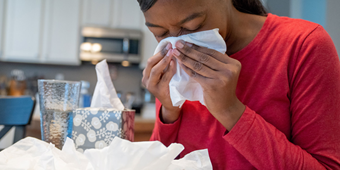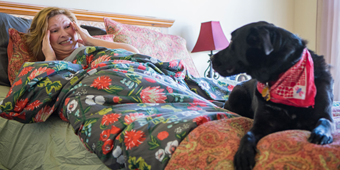Be Good To Your Lungs As You Age

Find Your Perfect Match
Answer a few questions and we'll provide you with a list of primary care providers that best fit your needs.
With every breath, your lungs deliver life-sustaining oxygen to your entire body, by way of your bloodstream. And every time you exhale, your lungs expel the waste product of the respiratory system, carbon dioxide.
As you grow older, though, your lung function declines gradually. You may find you’re not breathing as easily as you did when you were younger or you get short of breath often.
But there are steps you can take to help improve and maintain lung function throughout your life.
The Mechanics Of Breathing
To understand how aging can affect lung function, it’s helpful to know a little about how the physical act of breathing works.
Your lungs sit on either side of your heart, behind your rib cage in a space called the thoracic cavity. At the bottom of the thoracic cavity is a sheet of muscle called the diaphragm. When you breathe in, the diaphragm contracts and pulls downward. This creates suction in the chest, drawing in air and expanding the lungs.
This combined stretching motion expands the size of the thoracic cavity, decreasing the air pressure in the cavity and quickly drawing air into the lungs. When you breathe out, the diaphragm relaxes, the volume of the thoracic cavity decreases, and the air pressure in the cavity increases. The lungs contract, forcing out air.
As you grow older, though, your lung function declines gradually. You may find you’re not breathing as easily as you did when you were younger or you get short of breath often.
The Effects Of Aging On the Lungs
Older people and those who are immunocompromised are at increased risk for lung infections such as pneumonia and bronchitis, shortness of breath, low oxygen levels, and breathing-related problems like sleep apnea. This is because as you get older, the parts of the body involved in the act of breathing can begin to deteriorate or work less efficiently.
 Chest and spine. With age, bones get thinner and change shape. The rib cage may not be able to expand and contract as efficiently as it did when you were younger. These changes can lower the oxygen level and increase the level of carbon dioxide in the body, resulting in symptoms such as tiredness or shortness of breath.
Chest and spine. With age, bones get thinner and change shape. The rib cage may not be able to expand and contract as efficiently as it did when you were younger. These changes can lower the oxygen level and increase the level of carbon dioxide in the body, resulting in symptoms such as tiredness or shortness of breath.- Lung tissue. Weakening muscles and other tissues around the airway structures may cause the airways to close too easily. The tiny air sacs inside the lungs (alveoli) where the oxygen/carbon dioxide exchange takes place can lose their shape and function less effectively.
- Nervous system. Changes in the part of the brain that controls breathing can create problems, causing you to take in less oxygen or retain too much carbon dioxide.
- Immune system. The immune systems can weaken with age, leaving you less able to fight off lung infections or recover from exposure to smoke or other harmful airborne substance.
Keep Your Lungs Healthy
While some deterioration of physical capacities is a natural part of aging, you can take steps to decrease the negative effects of aging on your lungs and reduce your chances of contracting a lung disease. Here’s how:
- Don’t smoke. Smoking is harmful to your lungs and will cause them to age more quickly. It is a major cause of lung cancer and chronic obstructive pulmonary disease (COPD).
- Get the right amount of exercise for your age and capabilities. If you are unsure how much exercise you can handle, ask your health care provider for advice. Regular exercise can help improve your lung function.
- Keep moving. Staying in bed or sitting for long periods allows mucus to accumulate in your lungs and puts you at risk for lung infections. This is particularly true after surgery or when you are ill.
- Avoid pollution. As much as possible, minimize your exposure to pollution — indoors and outdoors. Indoor pollutants include things like secondhand smoke and chemicals in the home and workplace. Outdoor pollution can vary from day to day, so check the pollution forecasts in your area and avoid exercising outside when pollution levels are up. Also avoid exercising near high-traffic areas, where pollution levels can be high.
- Prevent infections. Help keep infection away, and out of your lungs, by washing your hands often, avoiding crowds during cold and flu season, getting the flu vaccine every year, and practicing good oral hygiene.
Find Your Perfect Match
Answer a few questions and we'll provide you with a list of primary care providers that best fit your needs.
Sources: Medline Plus; American Lung Association




